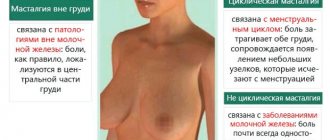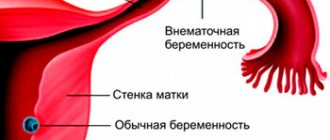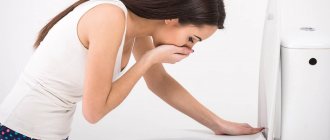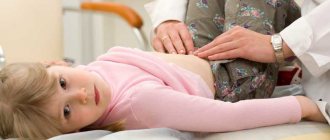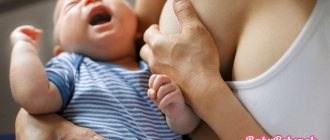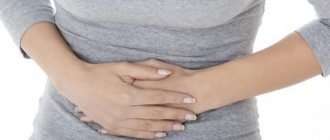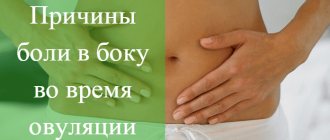The nature of the discomfort
Pain in the gland is usually accompanied by heaviness and swelling. The nipple and areola area may begin to hurt. Many people feel a tingling sensation in the thickness of the mammary gland, as during lactation.
Painful sensations are most intense at the time of ovulation. In the middle of the monthly cycle, the pain is stronger than during menstruation.
Pain in the gland during menstruation is less intense and is temporary. It passes quickly, since pregnancy has not occurred, and the female body begins to prepare for the next ovulation.
Usually during menstruation a woman feels minor discomfort. The pain manifests itself with low intensity - a pulling sensation is felt in the lower abdomen and slight engorgement of the chest. If your chest hurts severely, this may indicate a pathology.
Pathological manifestations include the manifestation of spasms in the lower abdomen and severe pain in organic structures. However, in 5% of cases such manifestations occur even in the absence of the disease. Usually discomfort is accompanied by a decrease in physical activity. When your mammary glands hurt and you don’t have your period, you need to see a doctor. This may indicate the development of pathology in the body.
Why do my breasts hurt before my period?
Chest pain before menstruation torments many females and gives them a lot of discomfort. Why do breasts hurt before menstruation and what is the cause of this pain?
The physiological structure of the female body implies systematic changes in hormonal levels. The main reason for hormone fluctuations is menstruation.
Every month, a woman’s body prepares for procreation, and if pregnancy does not occur, then a new one replaces the old egg.
This is accompanied by some symptoms:
- Bloody discharge;
- Breast pain;
- Nagging pain in the lower abdomen;
- Sometimes nausea and dizziness;
- General weakness.
Why do mammary glands hurt before menstruation and can they be avoided? Breast pain a week before menstruation or in the middle of the cycle and foreshadows ovulation (individually for most women). It is during ovulation that a woman's body is filled with hormones called estrogens.
And as soon as the amount of estrogen exceeds the norm, the chest begins to hurt. This is like a kind of female indicator of the level of female hormones.
Some women complain that their nipples hurt before their period or their breasts hurt very much before their period. Women often ask why their nipples hurt before their period? These are all signs that a woman’s body is ready to bear a child, and the body reacts differently to increased hormones.
Some women show virtually no symptoms, while others suffer during this period and wait impatiently for the pain to end. So why do your breasts hurt so much before your period?
This process, when the chest hurts very much before menstruation, is called mastodynia and is one of the signs of menstrual syndrome. Estrogens cause swelling of the glandular tissue and milk ducts, after which there is a change in breast size in a larger direction, swelling, the skin on the chest becomes tense, and the breast itself is harder than usual.
It is considered normal for mammary glands to hurt before menstruation, but in any case, a woman needs to visit a gynecologist, mammologist and endocrinologist once a year. The breast often changes and neoplasms are possible, which are not always benign. Chest pain before menstruation requires medical supervision.
Causes
Before the onset of menstruation, the level of hormones in the body changes. Oxytocin and prolactin stop being produced in large quantities. Progesterone and estrogen substances begin to predominate. These hormones promote the shedding of the upper layer of the uterus during menstruation.
There are natural physiological causes of breast tenderness. In such situations, the pain is minor. Cyclic chest pain is normal and does not require medication correction. In the presence of various disorders, the pain is protracted and of great intensity. In this case, you need to consult a doctor and identify the causes of its occurrence.
What determines the intensity of pain?
Some women do not even feel discomfort in the bust area, but for the other half this is a serious problem. Sometimes sleep is disturbed due to pain, so you have to consult a doctor.
The strength of discomfort depends, first of all, on the psychological state of the patient. There are more and less sensitive women.
There are other features:
- Breastfeeding mothers experience pain less frequently than those who have not used this method of feeding. Such patients are not bothered by mastopathy.
- Women who are trained in sports do not feel not only chest pain, but also the signs of premenstrual syndrome in general.
- Stress and difficult life situations lead to inconvenience and pain, and positive emotions and calm reduce such feelings.
Thus, we can say that the strength of chest discomfort is directly related to the mental and physical state of the patient - the level of mental stress and general well-being.
Hormonal imbalances and irregular cycles
If the body's hormonal balance and the production of necessary substances are disturbed, then the breasts will hurt for a long time. One of the main causes of chest pain during menstruation is hormonal imbalance.
Often, a failure in the production of necessary hormones is associated with stress. A woman’s body is less stress-resistant, so it reacts very sharply to the slightest fluctuations in the emotional background.
Stress causes insomnia, depression and has an extremely negative effect on the functioning of all body systems.
Under stress, menstrual irregularities are often observed. Irregular onset of menstruation can be associated with overwork. Sometimes it is enough to have a good rest and sleep, reduce the workload so that the monthly cycle normalizes and the body begins to function without problems.
Causes of chest pain requiring treatment
If a month has passed since your last menstruation and chest pain persists, you should see a specialist. The reason for the persistence of a painful state in the glands can be very serious disorders in the body:
- Failure of the normal background of hormones - failure of the balance of hormone levels in the female body is a very dangerous thing. It's not worth joking with him, that's for sure. In addition to the fear of losing the ability to bear children, delaying treatment for this problem can lead to many dangerous diseases. External factors can cause a woman’s hormonal imbalance: problems, stress, heavy physical activity; and the presence of any disease.
- Gynecological diseases - since a woman’s reproductive organs, the functioning of the menstrual cycle and hormones are all interconnected with the mammary glands - the reason that the period has passed, but the breasts do not think of stopping hurting, may be a gynecological disease. After all, a sick body immediately begins to send signals to all interconnected organs.
Possible solution to the problem
That is why you should always watch your body and listen to it. If your breasts start to hurt when your period should begin, pay attention to this. If after its completion your chest does not stop hurting, you should definitely see a doctor. Otherwise, a woman risks a lot, in addition to her own health.
If painful sensations are not present all the time, but appear periodically, you need to start keeping a small diary. Watch your body for a couple of days. When pain appears, start writing down: day, time, place, what you did and ate before the pain appeared. This can be very important information for your doctor and will give him a more complete picture of what is happening in your body.
Relief of pain caused by natural causes
When their breasts hurt very badly, before menstruation, women ask the question “can anything other than medications help them!?”:
- The first way is to give up bad habits such as cigarettes and alcohol.
- The second good way is to take a warm bath. Just remember that under no circumstances is it hot. Only warm. Can be done with sea salt. Using salt baths helps the entire body relax, relieve fatigue and relieve muscle pain.
- The third is the use of dietary foods in the diet. It is worth giving up spicy, fried and salty foods for at least a few days.
- The fourth is wearing loose underwear. Thick and tight underwear keeps muscles and tissues under tension for a long time. It can also cause pain in pinched blood vessels and nerve endings.
Every woman should remember that her body is very vulnerable and fragile during menstruation. At this time, you should be most attentive to yourself and your body. If you experience chest pain before your period, you should not be alarmed right away. But if your chest continues to hurt after these treatments, be sure to consult a doctor.
Gynecological diseases
Various gynecological pathologies can lead to breast pain during menstruation. This is due to the fact that the functioning of the genital organs and the functions of the mammary gland are closely interrelated. The female gland reacts sharply to pregnancy.
It may hurt throughout your period and even longer. Severe discomfort can be felt at any age - during menopause, late menstruation, pregnancy. Pathology can also occur in adolescents.
Pathologies that cause pain in the paired organ:
- Breast cyst
- Mastitis
- Ovarian cyst
- Endometriosis
- Uterine fibroids
- Tumors in the mammary gland
- Cancer
The disease disrupts the production of hormonal substances, causing a disruption in the levels of estrogen and progesterone. Chest discomfort increases, and with further development of the pathology, the unpleasant sensation intensifies.
Characteristic symptoms of the disease are frequent or periodic pain in the chest of great intensity, heaviness inside the mammary glands, secretion from the nipples. Both young girls and mature women can get sick.
With a breast cyst, discomfort in the chest resembles a burning sensation. It intensifies during menstruation. A cyst rarely develops into cancer, but requires constant treatment and monitoring. You need to see a doctor at the first signs of pathology.
Unpleasant sensations in the chest are also observed with mastitis. A dangerous process occurs when breastfeeding is abandoned. Discomfort may also develop in the first week after birth, when breastfeeding is not properly established. The baby may have difficulty sucking milk; stagnation of milk forms in the breast ducts, which causes pain and the onset of mastitis. It is important to continue breastfeeding and expressing milk.
With an ovarian cyst and uterine fibroids, tingling appears not only in the chest, but also in the lower abdomen. The neoplasm begins to compress the surrounding tissue, receptors and nerve endings react with acute pain to this process. With various gynecological diseases, a woman’s chest tingles and burns. The gland often swells and heaviness is felt. Cells can change and cancer occurs.
A tumor in the mammary gland or genital organs can be benign or malignant. In oncology, a developing tumor can be detected using palpation and various diagnostic methods.
What kind of pain can there be?
Should I worry about discomfort in my chest? To answer this question, it is necessary to understand how pain occurs, cyclically or randomly.
In the first case, there are no deviations from the norm. The discomfort ends with the cessation of menstruation, and on critical days the chest pain is not acute. It is advisable for women to record not only the dates when menstruation begins, but also the days when the accompanying symptoms end. This makes it easier to track hormonal and age-related changes.
If the pain is not cyclical, the opposite is true. It occurs on any day of the cycle. The chest hurts a lot due to hormonal imbalances, tumors and other diseases of the female reproductive system, muscle strain. If this phenomenon lasts more than 2 months, the patient needs to consult a specialist: a gynecologist or mammologist.
In addition to the severity of painful sensations, there are a number of signs that a woman should pay special attention to:
- severe tightening of the mammary glands;
- nipple pain;
- thickenings in the bust area that can be touched;
- dizziness, nausea, high temperature;
- pain occurs after the cessation of menstruation.
Diagnostics
To establish an accurate diagnosis, you will need to undergo a series of examinations and take hormone tests. These are the first-priority measures to identify pathology. A non-pregnant woman should donate blood for hormones at certain times of the monthly cycle. It is recommended to take a prolactin test on days 1-5 of the cycle.
The entire monthly cycle is greatly influenced by progesterone. The hormone prepares the structures of the uterus for conception. Its level and the degree of estrogen need to be identified to clarify the cause of chest pain.
You will also need to do:
- Ultrasound of the mammary glands
- Mammography
- Analysis of biomaterial for tumor markers
- Ultrasound of reproductive organs
After a thorough examination, the doctor will prescribe the necessary medications that will help localize the pathology and eliminate chest pain. It is important to undergo a test using tumor markers. Further treatment depends on a negative or positive result.
Looking for a reason
There is no clear answer to the question of the origin of pain, but there are a number of the most common causes:
- Uncomfortable underwear. It often happens that, giving preference to beauty, women forget about the convenience of a bra. As a result, a cute push-up bodice with underwire only causes discomfort;
- Cold (chapping);
- Avitaminosis;
- PMS is a particularly common cause;
- Height;
- Pregnancy;
- Nervous tension;
- Dry nipples;
- Presence of a cyst;
- Towel hardness;
- Chlorinated water;
- Inappropriate hygiene products (soap, shower gel, cream);
- Improper breastfeeding;
- Vasospasm;
- Psoriasis;
- Fungus;
- Mastitis;
- Breast surgery;
- Rapid arrival of milk during natural feeding;
- Nipple hypersensitivity;
- Hardening of the skin;
- Allergic reaction.
Why do breasts hurt before ovulation and menstruation?
Most often, women experience pain before menstruation, but sometimes discomfort haunts a woman both during and after menstruation.
The mammary glands change throughout each life:
- During pregnancy;
- Menstruation;
- While breastfeeding;
- After childbirth.
This is explained by the fact that a woman’s hormonal background changes periodically, which is influenced by prolactin, estrogen and progesterone. The balance of these several hormones affects breast metamorphosis.
It is worth noting that they are actively produced during menstruation and during ovulation, respectively, and pain appears more often at this time.
Breast tenderness
In the 2nd stage of the menstrual cycle, before ovulation, the receptivity of the breasts and nipples increases significantly. Profiling occurs, that is, the number of epithelium in the lobules and ducts of the mammary gland increases.
Blood circulation becomes more powerful, swelling and density occur, as a result of which the mammary glands increase in size.
If a woman is healthy, then these signs are not clearly expressed and do not interfere with continuing to lead a familiar lifestyle.
Pain during menstruation
Before menstruation, the glandular tissue grows significantly. She needs time to get back to normal. Usually the pain subsides in the last days of menstruation. However, to be sure that everything is in order with the body, you need to visit a doctor.
After all, an overly pronounced symptom may be a sign of a hidden pathology:
- Hormonal imbalance. The expert must determine whether it is caused by the fact that the woman is going through a certain period of the menstrual cycle, or by the fact that the functioning of the corresponding glands is disrupted;
- Gynecological diseases. Quite often, it is diseases in this area that are characterized by chest pain.
Stopping pain before menstruation
If the symptom stops bothering you before menstruation, then this is a sign that the woman is not pregnant. When the phenomenon is monitored regularly, a hormonal imbalance is acceptable.
Pain at different periods, independent of the cycle, may indicate pregnancy, inflammation or stretching of the chest muscles, as well as a cold or hypothermia.
Symptoms may also indicate more important reasons, such as ectopic pregnancy, mastopathy, breast cancer, inflammation or infection of the mammary glands.
Why does it hurt only under the left breast?
Among the particularly frequent complaints voiced to doctors is pain only under the left breast. This phenomenon may be a sign of a serious pathology of the gastrointestinal tract, heart, spleen, pancreas, etc.
The main reasons why it hurts only under the left breast:
- Heart attack. May appear due to thrombosis or embolism of the spleen, rheumatism, coronary heart disease, endocarditis, portal hypertension;
- Cyst/abscess/trauma/rupture of the spleen;
- Infectious mononucleosis;
- Splenomegaly;
- Torsion of the pedicle of the spleen.
Among the gastrointestinal diseases, the following should be highlighted:
- Diseases of the small intestine, accompanied by dull and aching pain;
- Gastric ulcer;
- Gastritis;
- Dyspepsia with pain and nausea;
- Hiatal hernia;
- Oncology of the gastrointestinal tract.
Pain can be caused by diseases in the field of cardiology:
- Angina;
- Acute myocardial infarction;
- Aortic aneurysm;
- Pericarditis;
- Mitral valve prolapse;
- Osteochondrosis;
- Intercostal neuralgia.
In addition, the following disorders and pathologies can be identified:
- Vegetative-vascular dystonia;
- Pneumonia;
- Pleurisy;
- Fibromyalgia;
- Cyst/fibroadenoma/abscess of the breast.
It is worth paying serious attention to this task, contacting an expert and conducting a comprehensive examination and diagnosis. Depending on the nature of the pain and its intensity, it is necessary to identify the cause of the origin of this condition.
Pain may be:
- With distinct localization;
- Sharp;
- Sharp;
- Spastic;
- Dumb;
- Aching;
- Shooting;
- Superficial.
Each type of pain is characteristic of certain diseases, and their nature will help the expert make an accurate diagnosis.
Thus, the answer to the question of why the breasts hurt before and after ovulation is very primitive - the hormones that are vigorously produced during this period are to blame. This condition can be perceived as typical if it is not too pronounced and stops immediately after the end of menstruation.
If the chest hurts only on the left side, then this is a sign of serious problems in the functioning of the body and a reason for urgently consulting a doctor.
Human physiology is complex and unique. Working as a coherent mechanism, all systems are aimed at maintaining balance and regulating the functions of the individual. Otherwise, failures occur that develop into diseases.
The female body is doubly susceptible to the influence of hormones, as it is designed for procreation. For this reason, cyclical changes in the fairer sex sometimes cause problems that men rarely encounter.
Therapy and prevention
Treatment of pain depends on the identified causes of its occurrence and the established diagnosis. The therapeutic course is aimed at correcting hormonal levels, eliminating stress, and restoring metabolism.
In the presence of an infectious-inflammatory process or neoplasm, the prescription of non-steroidal anti-inflammatory drugs and medications of other drug groups will be required.
In the presence of nodes, cysts or tumors, surgery is used. The operation is based on removing the painful focus. In some cases, complete removal of the mammary gland will be required. Cancers are also treated with chemotherapy and radiation.
To prevent pain in healthy breasts from appearing during menstruation, it is necessary to adhere to some preventive measures. Important:
- Periodically perform a breast self-examination in front of a mirror.
- Monitor your menstrual cycle
- Wear the right bra
- Lead a healthy lifestyle
- Eliminate stress from life
A contrast shower can improve blood circulation in the mammary glands. Water jet massage is an excellent prevention of breast diseases. To strengthen muscles, it is useful to exercise and exercise in moderation.
Wearing the right bra plays a big preventative role. Underwear prevents the development of the disease; it supports the breast tissue in the desired position.
How to relieve pain not associated with diseases
To make the discomfort less noticeable, you need to adjust your diet and lifestyle. It is important not to abuse alcohol and smoking. These negative factors can cause many changes in the human body.
You should not overuse pickles, smoked meats and fried foods. Eating more vegetables and fruits is good for breast health. Before the onset of menstruation, you can take a relaxing bath - it will reduce the tone of smooth muscles and reduce soreness in the breasts.
Often the harbingers of menstruation are unpleasant symptoms. One of them is breast swelling and painful sensation in its area. What does this mean and should I worry?
Possible pathologies
Even though 4/5 of the entire population of the Earth may experience breast pain during menstruation, it is impossible to ignore this at all. A change in the intensity of pain may indicate developing pathologies. In the same way, it is better to check with a doctor if a constant companion of menstruation - chest pain suddenly disappears, provided that all previous conditions remain the same.
Attention! In the first stages, breast cancer develops asymptomatically.
Chest pain during menstruation can persist or even intensify due to various pathologies:
- mastopathy;
- ectopic pregnancy (in this case, the bleeding is actually caused not by menstruation, but by a miscarriage);
- infectious diseases;
- inflammatory processes occurring in the mammary glands;
- mastitis of infectious or traumatic origin;
- hormonal disorders caused by thyroid disease;
- liver diseases;
- gynecological problems.
Many of these diseases occur rather secretly. In some cases, women do not associate breast tenderness with internal diseases of the organs. If the body’s normal routine has changed and the mammary glands begin to hurt at a different time or more severely than usual, a medical examination will be required.
How to Reduce Breast Pain
In cases where the mammary glands hurt during the second phase of the menstrual cycle and you want to reduce the discomfort, it is recommended to adhere to proper nutrition, limit your intake of liquid, salt, coffee, tea, alcohol and some other products.
The use of soothing herbal decoctions, as well as preparations containing magnesium, helps.
To prevent pain in the chest area before menstruation, it is recommended to avoid stress, hypothermia and physical fatigue.

